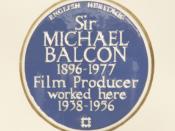I think that it is very difficult to ignore the contribution made by British Cinema during the years 1939 to 1945. Due to an entertainment tax imposed in an effort to boost the country' s economy cinema prices had risen, however, 'it was calculated, everybody in Britain under the age of 40 (sic) went to at least fifty three feature films a year'1. This shows the widespread access and the potential influence cinema had on the general public. Not only was the cinema used as a place of entertainment but also as a place to hear of current affairs from the weekly newsreels. The late 1930s had been a struggle for Britain to successfully compete in the international marketplace, however, the Second World War gave the British film industry and its filmmakers an ideal opportunity to shine. The nation was looking for support and reassurance and the film industry was in an ideal position to do just that.
British wartime cinema entered its most fruitful period on record with a sudden, and necessary, burst of creative activity.
As the documentary filmmakers of the 1930s had previously discovered their role to be that of commentator, to reflect society and to mirror the strengths of the British public, they were quickly utilised to produce films that would inform and unite a population in crisis. A national identity was being sought and, at last, documentary had found its niche and enjoyed the greatest audience attendances of its history. These films were championed for their realistic qualities and non-sensationalism of the war. However, whilst docu-realism was directly informing the public of wartime events purely fictional films were providing a light-hearted distraction from the atrocities of daily life. These films echoed in a more subtle fashion the propagandist themes perpetuated by the government. This newfound...


![English: Cambridge House, Cambridge Grove The front view of this [41920]. Hard to believe this house squashed between a metal coatings workshop and a foreign students' hall of residence was a pioneer of the British film industry being one of the earliest](https://s.writework.com/uploads/3/34915/english-cambridge-house-cambridge-grove-front-view-41920-har-thumb.jpg)